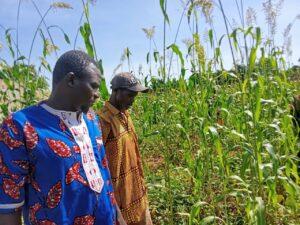On October 30, 2024, an experience-sharing workshop brought together members of cooperatives and
minority groups from the provinces of Cibitoke, Gitega and Ruyigi in Gitega, Burundi’s political capital.

Inades-Formation Burundi pays particular attention to minority groups – such as indigenous people, albinos and returnees – integrated into cooperatives, in line with the World Food Day 2024 theme: “Food rights for a better life and future: leaving no one behind”.
During the workshop, the Inades-Formation delegate presented initiatives aimed at integrating these vulnerable groups into sustainable human development projects. The AlimenTERRE Conscience Campaign was also highlighted, underlining the importance of healthy, sustainable food, and encouraging participants to produce and consume locally.
Inades-Formation Burundi is now in the process of integrating vulnerable and minority groups into various initiatives through and alongside cooperatives, with a view to valorizing their know-how and contributions to the sustainable human development of communities.
 In the same vein, the AlimenTERRE Conscience Campaign and its purpose were presented to participants to raise awareness of the need to adopt healthy, sufficient and sustainable food in all their initiatives. After all, a healthy diet helps reduce disease. The production of organic manure, known locally as NTABIZAWIMBURE (Bokashi), already tested, deserves to be developed and disseminated on a large scale to support the AlimenTERRE Conscience Campaign.
In the same vein, the AlimenTERRE Conscience Campaign and its purpose were presented to participants to raise awareness of the need to adopt healthy, sufficient and sustainable food in all their initiatives. After all, a healthy diet helps reduce disease. The production of organic manure, known locally as NTABIZAWIMBURE (Bokashi), already tested, deserves to be developed and disseminated on a large scale to support the AlimenTERRE Conscience Campaign.
The application of Bokashi produces positive results. In addition, sufficient quantities can be produced and applied within 15 days of production. The INADES-Formation Burundi team also detailed how Food is a right, and eating is a vote.  They insisted that women and everyone else should make their own choices about what to eat.
They insisted that women and everyone else should make their own choices about what to eat.
To strengthen a better future, participants discussed the best methods of introducing integrated crops, enhancing market garden crops, fruit trees, agro-forestry plans, protecting fields and arable land in order to ensure and safeguard food security.
 With the help of the facilitators, the participants were able to take stock of the various vegetable crops. It became apparent that, given the regional diversity of the participants, some legumes, such as spinach, celery, parsley and many others, were unfamiliar to some. This session therefore offered an opportunity for mutual enrichment and collective discovery.
With the help of the facilitators, the participants were able to take stock of the various vegetable crops. It became apparent that, given the regional diversity of the participants, some legumes, such as spinach, celery, parsley and many others, were unfamiliar to some. This session therefore offered an opportunity for mutual enrichment and collective discovery.
Published by HAVYARIMANA Richard,
Advocacy and Communication Officer











